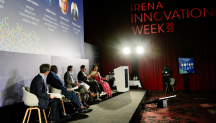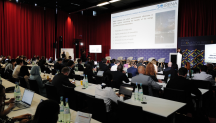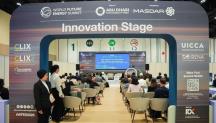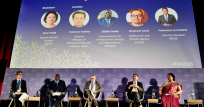
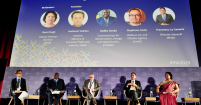
Innovation Week 2025 As It Happens - Day 1
Newsletter
Innovation Week 2025: Background
IRENA Innovation Week brings leaders, experts, industry representatives, academia, youth and policymakers together to explore cutting-edge innovations that can drive the global energy transition and advance sustainable development, enabled by renewable energy and digitalisation technologies.
The fifth edition of Innovation Week, taking place in Bonn, Germany, builds upon previous successful gatherings, each focusing on different aspects of the renewable energy transition. This evolution has progressed from the 2016 and 2018 editions that focused on innovations to decarbonise power systems and integrate high shares of renewables, through the 2020 and 2023 editions that explored innovation solutions for decarbonising end-use sectors.
The 2025 edition focuses on two aspects: Innovation in infrastructure for tripling renewables and Renewable-based solutions for sustainable development.
The discussions this week will highlight and explore pioneering renewable and digitalisation-driven innovations, address critical infrastructure gaps, resilient power systems, and productive energy use, while fostering collaboration among a dynamic global network of stakeholders from IRENA’s 170 member countries.
Stay tuned for more updates and see the event programme here.
High level dialogue: Innovation catalysing the tripling of renewables for sustainable growth
Under the COP28 Tripling Renewables Pledge, governments have committed to triple global renewable energy capacity to at least 11,000 GW by 2030, representing a critical pathway to limiting global warming to 1.5°C.
Against this backdrop, the high-level opening session brings together representatives from the public and private sector, international organisations and other stakeholders to discuss how the latest innovations in infrastructure, market mechanisms, and digital technologies can accelerate progress toward the tripling target. A focus will be placed on how these innovations can facilitate the decarbonisation of energy systems with renewable-based solutions that ensure reliability and affordability.
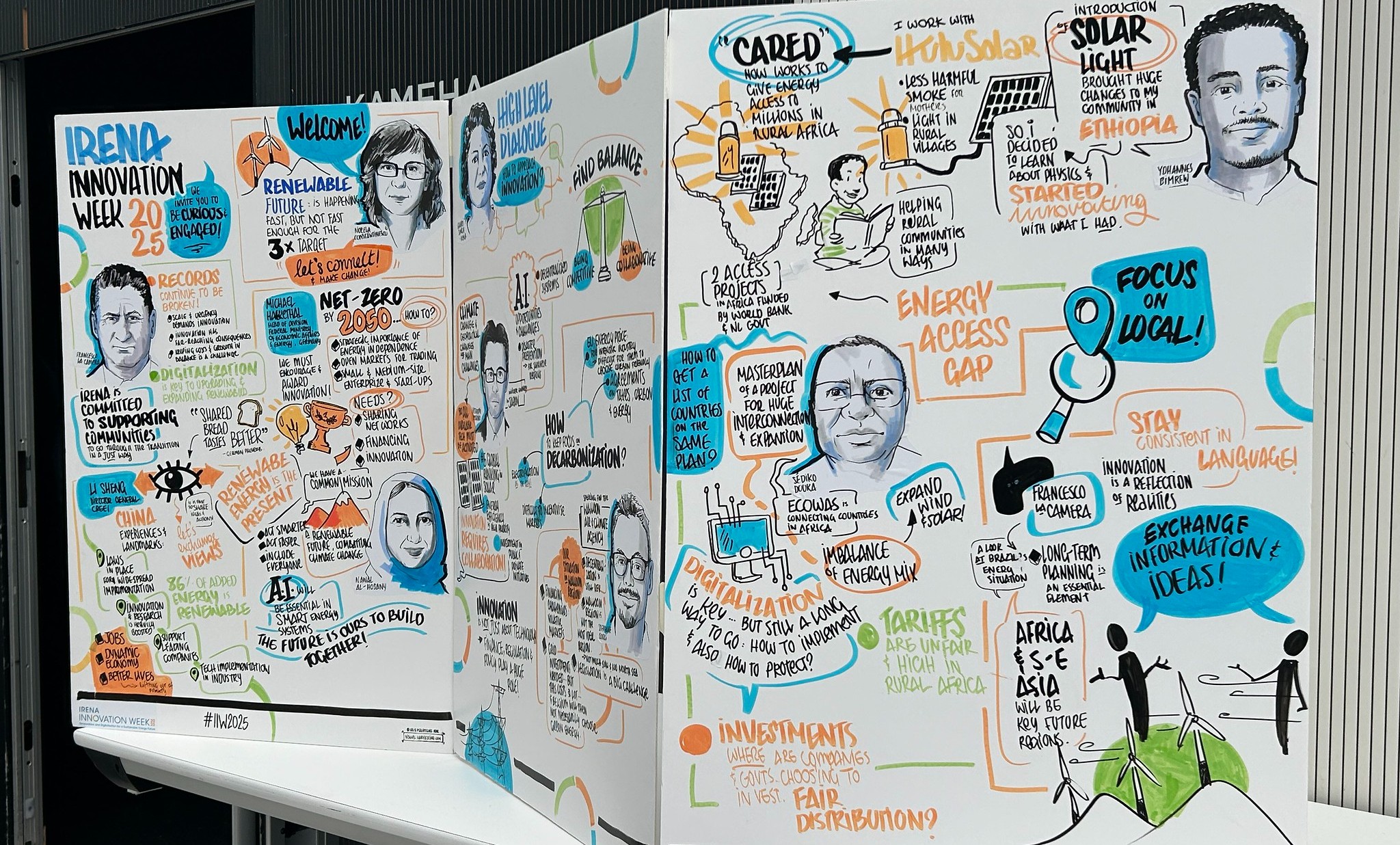
This session sets the stage for IRENA's Innovation Week 2025 by integrating insights from two pivotal aspects: infrastructure innovations for tripling renewables through digitalisation, and renewable-based solutions that advance sustainable development.
Norela Constantinescu, Acting Director, IRENA Innovation and Technology Centre (IITC), welcomed all attendees saying, “All the regions should have energy systems that are secure and affordable, renewables are the cheapest form of electricity. Looking ahead, all countries should take the advantage of innovations to gain access to electricity and develop their economic potential.”
 Francesco La Camera, the IRENA Director-General delivered the opening speech, saying, "This year’s theme, Renewables and Digitalisation for a Sustainable Energy Future, is not only timely, it is essential". Innovation is no longer optional, it is indispensable, helping to create new opportunities for all, he continued. Focusing on the theme of this fifth edition, he underlined that, "The scale and urgency of energy transition demands new thinking, new tools and new partnerships. Successful innovation is shaped by context and grounded in local realities, but is driven by a shared ambition." |
 Michael Hackethal, Head of Division, Federal Ministry of Economic Affairs and Energy, Germany, delivered a keynote speech emphasising the technological advancements' which have transformative potential in driving energy transition. He said, "The theme of this year’s Innovation Week captures the huge potential of technological advancements for energy transition, which we need together with policies. An efficient energy system is key to meet our decarbonisation targets, reach net zero, and ensure energy security." He highlighted countries' strategic focus on strengthening energy independence, noting, "Our markets need to remain open for investment. All nations are collaborating but also pursuing technological leadership. This dynamic is complex but can accelerate the energy transition." Addressing the scale of change required, he emphasised, “Infrastructure requirements that come with energy transition are substantial and urgent. Successful innovation requires forward-looking policy, financing and robust sharing networks." He concluded, "We can build an affordable and secure energy future through innovation." |
 Dr. Nawal Al-Hosany, the Permanent Representative of the UAE to IRENA, delivered her keynote speech emphasising the urgency of climate action. She said, "Climate change is no longer a distant threat; it is a lived reality. And yet, within this challenge lies unprecedented opportunity. Innovation is not just desirable - it is essential. It is our compass, our catalyst, and our most powerful tool in shaping a world powered by clean energy." She further encouraged all event attendees to take action and focus on impacts, saying, "We must innovate faster, act smarter and include everyone". Addressing the evolution of energy transition challenges, she noted, "The energy transition is no longer limited by our ability to generate clean power - but by how swiftly, reliably, and equitably we can deliver it to where it's needed most. This is a moment for bold leadership, for visionary partnerships, and for integrated systems that are not only smart, but just." |
In his keynote speech, Dr. Li Sheng,Director-General, China Renewable Energy Engineering Institute (CREEI), provided an overview of China's remarkable progress on the energy transition. He underlined that the growth of renewables in China contributed substantially to the global energy transition and provided three key benefits to local communities: more jobs, better lives and poverty eradication. He also praised IRENA as the world's leading international organisation that plays a vital role in fostering global cooperation towards our shared energy goals, encouraging further dialogue and knowledge exchange. He concluded saying, "Together, let's turn the shared the vision into tangible action through innovation and build not only a cleaner but sustainable world."
Yohannes Bimrew, IRENA Youth Delegate and CEO of HuluSolar, shared his personal experiences with the introduction of renewable energy to his community to address energy access issues, and how it inspired him to pursue a career in renewables.
The High-level dialogue on Innovation catalyzing the tripling of renewables for sustainable growth, moderated by Ms. Gauri Singh, Deputy Director, IRENA, is ongoing. Explaining why innovation in renewable energy is essential for the energy transition, she remarked, "Every time you think you have a solution, a new challenge appear," setting the scene for the panel discussion.
.jpg)
The opening session of the 2025 IRENA Innovation Week focused on accelerating renewable energy through innovation and digitalisation as key drivers for a sustainable energy future. Digitalisation, including the use of artificial intelligence (AI), is crucial for integrating renewables into power systems and end-use sectors, enhancing grid resilience and enabling smarter management. Speakers emphasised that innovation must be context-specific, involving upgrading infrastructure in industrialised countries and focusing on expanding energy access and building resilient systems in developing regions.
During the panel discussion, speakers highlighted that innovation must be systemic, encompassing not just technology but also policy, finance, and knowledge-sharing networks. Yoshiomi Yoshino, Director, Ministry of Economy, Trade and Industry, Japan, Sédiko Douka, Commissioner for Infrastructure, Energy and Digitalisation, ECOWAS and Stephane Cools, President, Walloon Air and Climate Agency (AwAC), Belgium shared their experiences with innovations for the energy transition, showing that innovation is not a luxury but essential to achieving energy transition goals at the required scale and speed. The speakers reinforced that the energy transition is unstoppable but requires continuously innovative approaches to address the evolving reality.
Overall, the discussion reinforced that the energy transition is unstoppable and requires not just technological advancements but also innovation in policy, business models, financing mechanisms, and strong international collaboration and knowledge sharing networks to overcome substantial infrastructure requirements.
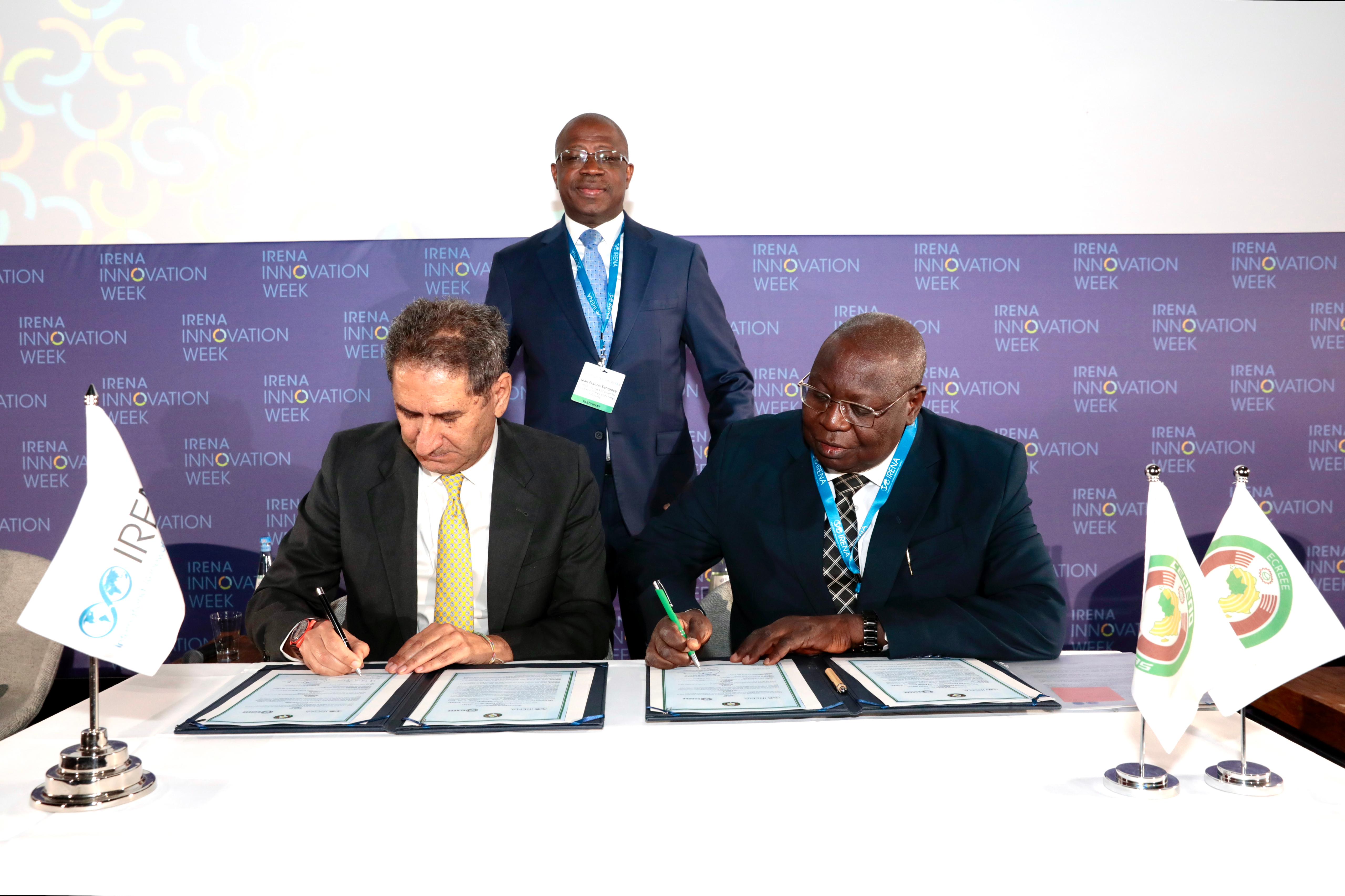
On the sidelines of the Innovation Week today, IRENA signed an Memorandum of understanding (MoU) agreement with ECOWAS Centre for Renewable Energy and Energy Efficiency (ECREEE) to strengthen cooperation and promote the development of renewable energy and improve access to modern energy resources.
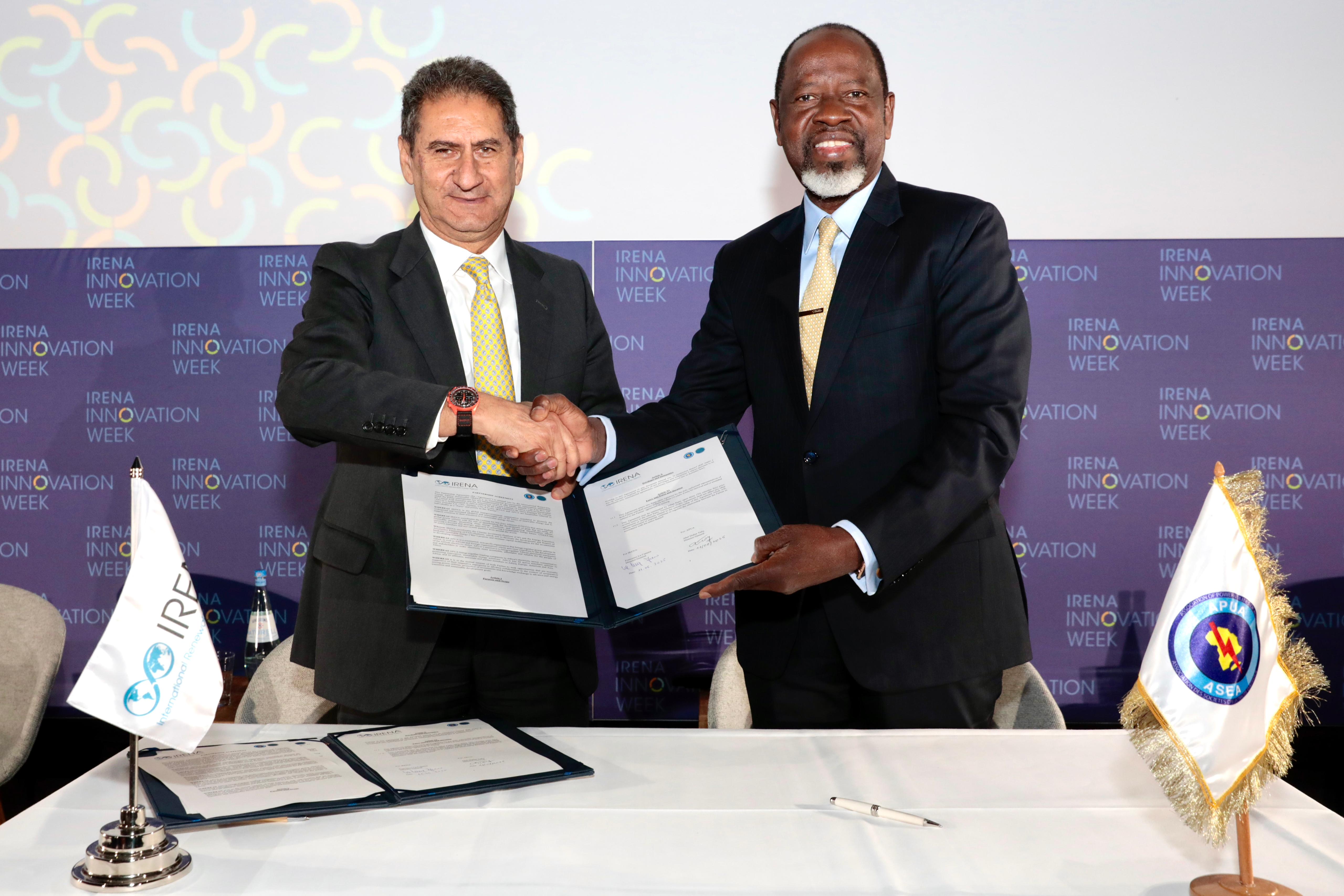
A second Partnership Agreement between the Association of Power Utilities of Africa (APUA) and IRENA was signed to advance collaboration on cooperation among power utilities, promotion of investments and knowledge exchange to accelerate just energy transition and sustainable development goals.
IRENA NewGen Hackathons for Youth – Launching Event
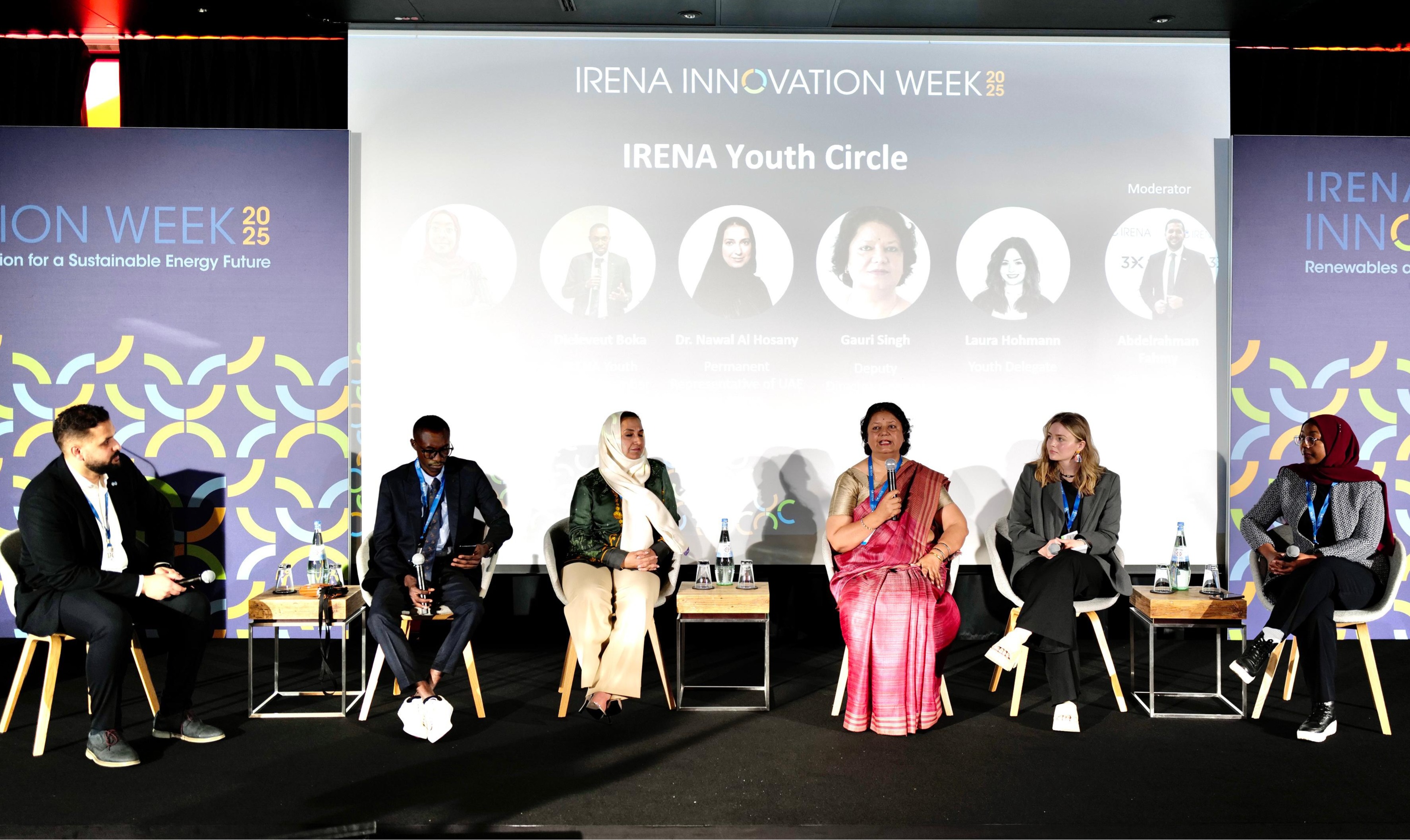
The IRENA NewGen Hackathons for Youth launched today at the sidelines of the IRENA Innovation Week. IRENA will engage regional youth organisations, Utilities for Net Zero Alliance (UNEZA), Alliance for Industry Decarbonisation (AFID) and Coalition for Action as partners in the implementation of the upcoming hackathons.
The event featured a Youth Cycle discussion between the youth delegates and IRENA Deputy Director-General Gauri Singh and Permanent Representative of the UAE to IRENA Dr. Nawal Al-Hosany.
Dr Nawal Al Hosany shared her thoughts on what is needed to make the cooperation with Youth a success. "Renewables is a cornerstone of climate action", she said. She continued outlining how crucial it is to find solutions that meet both, ours and the planet's needs. Innovation provides an opportunity to do that.
Day 1 sessions on Innovation in infrastructure for tripling renewables
Planning for the future: Demand side narratives and scenarios
 As the global energy landscape undergoes rapid transformation, accurately capturing the dynamics of energy demand has become critical for planning a sustainable and resilient future. Co-ogranised by the Stockholm Environment Institute (SEI) and IRENA's Long-term Energy Scenarios (LTES) Network this session spotlighted methodologies that integrate socio-economic trends, behavioural shifts, and emerging technologies into energy scenarios. |
The panel discussion highlighted how the narrative around energy planning has evolved from a static view of energy demand and planning to a broader, more engaging, and dynamic perspective. Fiona Lambe, Senior Research Fellow, Stockholm Environment Institute (SEI) emphasised that "User needs are essential in transforming the energy system in an equitable manner," underlining that understanding the future of energy demand requires engaging with people rather than relying solely on top-down approaches. Yichun Gong, Researcher, Energy Strategy and Planning Institute, State Grid Energy Research Institute (SGERI) China, reinforced this perspective, noting that "Demand-side planning isn't just learning from history, it's the foundation of a low-carbon energy system."
The discussion explored how participatory and inclusive processes are crucial for effective energy planning. Charles Heaps, LEAP Developer and Senior Scientist, Stockholm Environment Institute (SEI) moderated the panel discussion and highlighted the human element of energy transition, stating, "Demand-side is about people, their livelihoods and development rather than technology." He concluded with an optimistic outlook, "The best way to predict the future is to invent it."
The panellists acknowledged that while artificial intelligence will be an unpredictable factor influencing demand, it could play a valuable role in forecasting future demand. However, they emphasised that innovative solutions must be balanced with considerations of how to improve energy planning to ensure it supports a fair, people-centred transition. Improved coordination among various stakeholders, such as different ministries addressing specific demand groups like transport, was identified as crucial for enhancing energy planning.
Connecting the dots: Bridging infrastructure gaps for renewable powered systems
Organised in partnership with State Grid Corporation of China (SGCC - CEPRI) this panel addresses the need to close infrastructure gaps for renewables. Utilities, policy makers, and industry representatives exchange experiences and best practices in addressing infrastructure challenges to further accelerate the adoption of renewables.
In her scene-setting presentation, Huang Yuehui, Senior Expert, Department of Renewable Energy, State Grid Corporation of China (SGCC – CEPRI), provided an overview of China's remarkable renewable energy expansion in recent years. She underlined that China is utilising its existing distribution network, with flexible interconnections between substation feeders, in order to balance distributed solar PV in the distribution network.
The session highlighted the urgent need for systemic innovation and anticipatory investment in power grids to support the accelerating deployment of renewable energy. Key priorities identified include expanding interconnector capacity, advancing digitalisation, integrating sector coupling, and enabling demand-side flexibility. The panel stressed the critical role of regulatory evolution, data sharing, and collaboration across stakeholders. Industry experts advocated for smarter investments over higher spending, pushing for digital infrastructure, AI-driven grid optimisation, and stronger safety standards for large-scale battery storage.
The consensus was clear: future grids must be agile, inclusive, and built on innovation, coordination, and regulatory adaptability to enable a just and sustainable energy transition. Rather than seeking a single solution to the evolving power system, the future will require a collaborative approach implementing various interconnected solutions.
Day 1 sessions on Renewables-based solutions for sustainable development
Modernising power grids for a renewable future in EMDEs
In partnership with the Electric Power Research Institute (EPRI) and supported by the Utilities for Net Zero Alliance (UNEZA), this event explored how grid modernisation can unlock renewable energy potential across emerging markets and developing economies (EMDEs), where grids serve as the backbone of the energy transition.
 The world has been adding record shares of renewable power capacity in recent years, with 585 GW added in 2024, and even more is needed to meet the tripling renewable power capacity target by 2030. Therefore, grids require massive expansion to cater for the integration of larger shares of renewables. In addition, the modernisation of grids is key to sustainability and renewable energy integration. But how much can digitalisation, smart controls and automation save in terms of infrastructure needs? In this context, the panel discussion commenced to answer this and other critical questions around modernising power grids for a renewable future. |
Pemy Gasela– Member, UNFCCC Technology Executive Committee (TEC) and Chief Director: International Climate Change Relations and Reporting, Department of Forestry, Fisheries and the Environment (DFFE), South Africa, brought up an important aspect of social equity into prioritising investments. “We need to approach grid modernisation in a way to ensure that vulnerable and historically underserved communities are not left behind," she underlined. In his closing remarks, Mark McGranaghan, Fellow, Electric Power Research Institute (EPRI) Europe, underlined that the investment in power grids needs to double compared to the current levels, but most importantly, investments need to be as effective as possible to ultimately reduce costs of energy for the consumers.
Bottom-up solutions: Energy communities
Panellists representing different parts of the global community discussed how community-driven renewable energy projects can accelerate the energy transition by empowering local populations with ownership and decision-making power over their energy sources. The discussion, organised in partnership with the World Wind Energy Association (WWEA) and supported by IRENA Coalition for Action, focused on how energy communities can cover the entire energy value chain, from localised generation for power, heating and cooling to energy services like storage and electric vehicle charging, while providing flexibility to the broader power system.
The panel discussion highlighted how community-driven renewable energy projects can accelerate the energy transition by empowering local populations with ownership and decision-making power over their energy sources. Ayu Abdullah, Managing Director, Community Energy Toolkit (COMET), emphasised the fundamental importance of local engagement, stating: "Development and progress doesn't happen on its own, it needs community engagement." She underlined that whilst off-grid and energy access discussions often focus on technological and business aspects, years of deploying off-grid solutions have revealed that community engagement, participation and endorsement are the critical success factors.
Manoj Gupta, CEO, Tata Power Renewable Microgrid Limited (TPRMG), reinforced this perspective, highlighting the economic dimension of community involvement: "If the community starts using the energy project for economic development, all other elements fall into place; if not, the project falls apart." His remarks underscored how economic empowerment serves as the foundation for successful community energy initiatives.
Panellists outlined three core principles for community energy: ownership, control, and retention of profits and benefits. Key enabling elements include creating local institutions, legal recognition, and empowerment to exchange power with the main grid. Developing local industry alongside community projects significantly benefits success. The discussion concluded that narrative change is crucial for community buy-in, shifting focus from climate change to development and local benefits, including those for women. Setting the right narrative guides policy, and the right policy guides funding.
Technology Innovation Showcase
The final event for today is the Technology Innovation Showcase, organised with the Net Zero Technology Center and supported by the Alliance for Industry Decarbonization. This session showcased breakthrough decarbonisation technologies addressing the industrial sector's significant challenge, which generates a third of global energy and process-related CO2 emissions.
The event was opened by Francesco La Camera, IRENA Director-General, who pointed out that decarbonising hard-to-abate industries is no longer optional. "Achieving net-zero emissions by 2050 in these sectors demands both radical innovation and deep systemic shifts," he added, emphasising the need for collaboration. The showcase proves that solutions already exist, he noted. "Together, we can drive a just, inclusive, and industrial transformation towards net zero powered by renewable energy," he concluded.
Urban Peyker, Mission Director, Mission Innovation, Net Zero Industries, continued with the opening remarks, underlining the importance of decarbonising hard-to-abate sectors. "Reaching net zero by 2050 will not be possible without transforming industrial operations at their core," he pointed out. This means rethinking processes and embracing technological innovation, digitalisation and system-level collaboration, he continued, leading up to the presentation of the winners of today's technology showcase.
Here are our winners of today:
- AFID Bionergy and CCUS Award winner: Giovanna Massobrio, Decarbonization R&D unit, SNAM and the award was presented by Kendra Rauschenberger, Siemens Energy, AFID Co-chair
- AFID Circularity Award and Audience Award winner: Pietrogiovanni Cerchier, CEO and Founder, 9-Tech and the award was presented by Dr. Nawal al Hosany, Permanent Representative of the UAE to
- IRENA AFID Green Hydrogen Award winner: Frazer Ely, Founder, Latent Drive and the award was presented by Hassan Al Ali, ESG & Sustainability engineer, EMSTEEL, AFID Co-chair
🏆 Winners of the AFID Technology Innovator Awards at #IIW2025:
— IRENA (@IRENA) 11 June 2025
🎯 Bioenergy & CCUS Award: Giovanna Massobrio, Decarbonization R&D Unit, @SNAM
🎯 Circularity Award: Pietrogiovanni Cerchier, CEO & Founder, 9-Tech
Presented by Dr. @NAH_208, Permanent Representative of the UAE to… pic.twitter.com/Xv2njqf4y5
This session concluded Day 1 of Innovation Week 2025: Renewables and Digitalisation for a Sustainable Future. Check the event programme for the rest of the week here.

